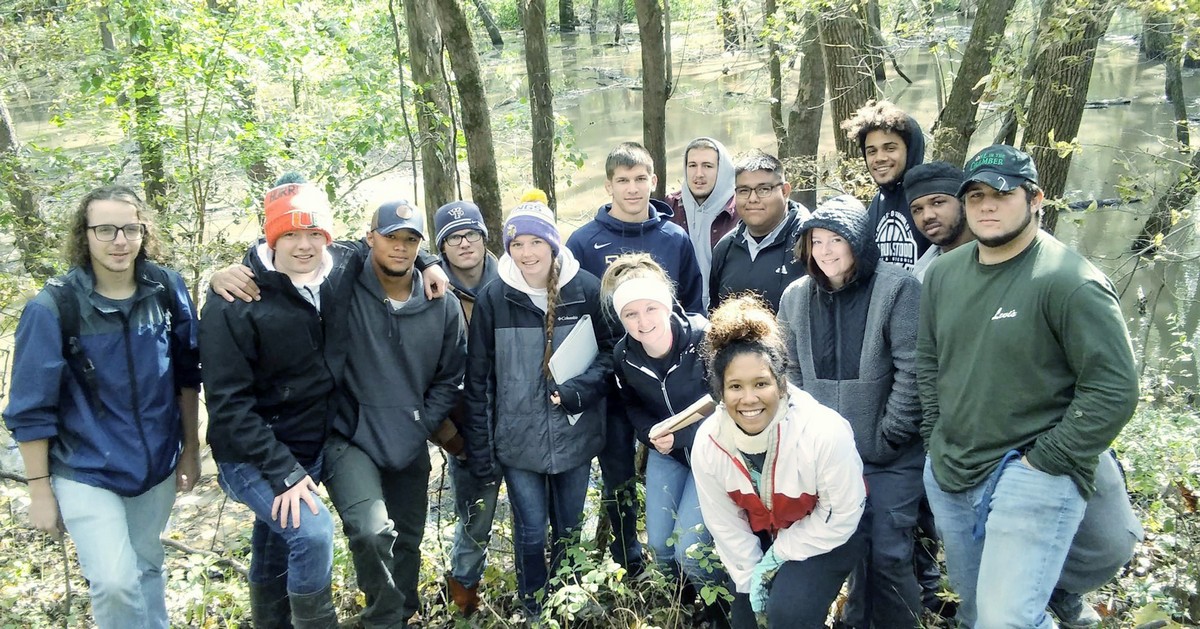Students at William Penn University Get to Experience the Great Outdoors
11/29/2018
Getting involved on a college campus as a student can oftentimes be daunting. Students are pulled in different directions with academics, athletics, and fine arts. But when a club and advisor go above and beyond to prepare you for life after college in an exciting way, you do not want to miss out.
That’s what Dr. Pete Eyheralde and the Wildlife Ecology Club on William Penn University’s Oskaloosa campus are doing. The group is known for taking trips and doing activities such as fishing, herping, canoeing, beekeeping, wildlife research, attending workshops and river clean-up. The most recent excursions include attending the Iowa Chapter of the Wildlife Society’s Fall Workshop at Lewis and Clark State Park—where the focus was on prairie management and butterfly management— and attending the annual meeting of the Central Plains Society of Mammologists at Oklahoma State University. Trips often take the club across state lines and into various landscapes to experience a wide variety of plant and animal life.
“Being a part of this club enhanced my experience by teaching me more about our local wildlife and getting more involved in our school,” says senior, Kaitlyn Lamphier. “For example, we are trying to set up an observation bee hive and we help take care of our prairie next to Penn.” Kaitlyn is the president and active member of the Wildlife Ecology club. “My favorite part about being in the club is learning about everyone’s different backgrounds and getting to attend wildlife conferences to see what projects are happening in the DNR. We also do fun activities like canoeing and bonfires,” says Kaitlyn.
The club’s focus is to provide learning opportunities for students interested in ecology, wildlife biology, fisheries biology, wildlife rehabilitation, conservation biology, and anyone who enjoys the outdoors. Although the club’s function is an extension of what is taught in the ecology, biology, and botany labs, members come from all different fields of study.
“The club is open to anyone who wants to join!” says Dr. Eyheralde. “We have sociology, education, engineering, earth science, and pre-med students, as well as biology majors in the group. Besides learning new things, these students just have fun with the activities we do as a club.”
Other than gaining new skills and knowledge, the huge advantage of being a part of the group is the networking opportunities with professionals in the field. “A recent Penn graduate who now works as a wildlife tech for the Iowa DNR, told me his job interview was easy because he knew all the interviewers from talking to the at Iowa Chapter of The Wildlife Society meetings and workshops,” says Dr. Eyheralde. These networking contacts have been a huge asset for students when seeking employment after graduation.
The Biology Major at William Penn University
A degree in Biology at William Penn University will provide graduates with numerous career choices through various environmental and research agencies. The major teaches students about the functions of humans and other organisms at the cellular and molecular level. Students gain the ability to conduct research while developing critical thinking skills, which will enhance their leadership qualities and provide a variety of opportunities. It will prepare students for further education in ecology, medicine, dentistry, optometry, veterinary science, physical therapy, forensic science, and other health and life science professions. It is also appropriate preparation for a career in laboratory research or biotechnology.
To learn more about the Biology program at William Penn University visit www.wmpenn.edu/biology
For more information, contact:
Miranda Keeler
Marketing & Communications Manager
641-673-1078 | keelerm@wmpenn.edu

